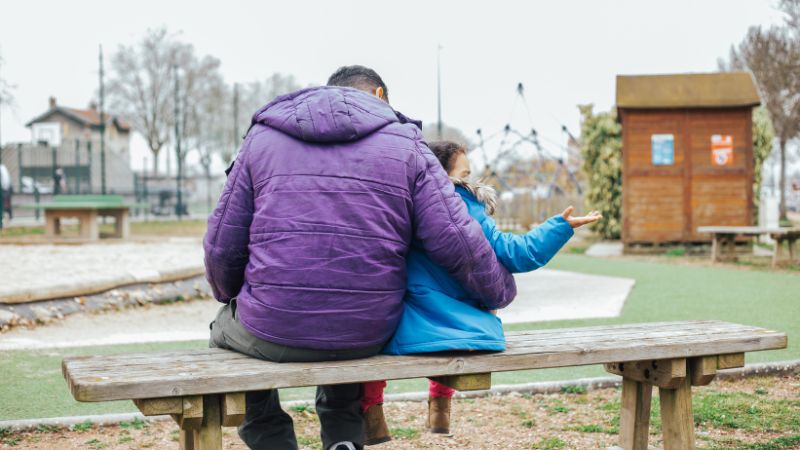Many parents worry that introversion will make their children difficult to integrate. However, with the right child-rearing and training, you can help your child overcome weaknesses and achieve success. In this article, we will share with you what you need to know about introverted children.
1 Signs of an introverted child
Children often feel shy and embarrassed in front of strangers, so it is difficult to determine if a child is introverted or not. Here are some signs that your beloved child may have an introverted personality:
- The child prefers to be alone and often gets angry and impatient when exposed to crowded, noisy environments or when forced to participate in too many activities.
- The child is always curious and explores everything around them, but they also have doubts.
- Before saying anything, the child observes and thinks carefully.
- The child often feels uncomfortable when interacting with strangers and takes a long time to get acquainted.
- Introverted children often have difficulty expressing emotions. Specifically, when speaking, children often pause to find the right words.
 Signs of an introverted child
Signs of an introverted child
2 Challenges introverted children often face
Introverted children often speak less and are shy, so they often face some difficulties such as:
- Introverted children may have difficulty contributing ideas in groups. They spend a lot of time thinking, so they often have many good ideas, but have difficulty presenting and defending their viewpoints.
- The child is afraid to participate in large group activities such as parties, social events. They also find it difficult to join club activities or group activities.
- In the case of transferring schools, the child finds it difficult to make friends and adapt to a new environment.
- The child has difficulty making friends and maintaining relationships with friends.
Challenges introverted children often face
3 10 tips for raising introverted children
Respect your child’s personal space
Introverted children have a preference for being alone. They often have dreams of their own world, so you should respect this preference. Parents should give their child some quiet time for privacy and recharge.
Encourage your child
Introverted children are often quiet and speak less. Therefore, they are often judged as shy, timid, and even slow. This can make the child feel hurt. Therefore, if your child is introverted, parents should regularly encourage them.
Regardless of their personality, children can excel in their own way. You can cite examples of famous introverted individuals like Bill Gates, J.K. Rowling, who are very successful. Encourage your child
Encourage your child
Give your child time to socialize with strangers
Introverted children feel shy and uncomfortable when interacting with strangers. Therefore, forcing a child to talk to unfamiliar people immediately is not advisable. Let your child have time to adapt and integrate with others.
Encourage your child to pursue their passions
Introverted children may have unique and different interests from their peers. In particular, they are often interested in scientific research, calligraphy, etc. Parents should respect these interests and provide opportunities for the child to pursue them.
 Encourage your child to pursue their passions
Encourage your child to pursue their passions
Teach your child to advocate for themselves
Introverted children are often shy, making them vulnerable to bullying and negative behaviors from others. Therefore, parents need to equip their child with self-advocacy skills to protect themselves and others.
Help your child express their emotions
When your child frequently struggles with sharing emotions, guide them to express themselves through drawing, journaling, or any method they feel comfortable with.
 Listen and help your child express their emotions
Listen and help your child express their emotions
Help your child understand that having fewer friends is not a bad thing
Whether a child is successful or not depends not on the number of friends. Therefore, if a child does not like to interact with many people, encourage them to spend time with their closest friends. Best friends will understand, empathize, help, and share with the child.
Communicate with your child’s teachers
Teachers often prefer children with quick and active personalities. Therefore, this can be a disadvantage for your introverted child. Share with the teacher about your child’s situation so they can provide appropriate support.
 Communicate with your child’s teachers
Communicate with your child’s teachers
Appreciate your child’s efforts
Frequently praise your child, even for small actions like initiating a conversation with a stranger. These compliments have a great significance, helping to boost the child’s confidence.
Observe to help your child at the right time
Introverted children are often independent and do not like to ask for help. Therefore, you should not rush to help them with something. Instead, observe and give the child some time to recognize the problem and provide timely assistance when necessary.
 Observe and provide timely support for your child
Observe and provide timely support for your child
Through this article, we have shared with you what parents need to know when raising introverted children. We hope this information will be useful to you in accompanying your beloved child.
Source: Hellobacsi.com
Influence of Parents or External Factors on Personality Development.
Is personality inherited from parents or shaped by nurture? This is a debate that has been going on for a long time. Some argue that personality traits are genetically passed down from our parents, while others believe that they are entirely influenced by environmental factors and upbringing. So, what do the experts have to say about this?


































